UKCBC Travel and Tourism: Legislation and Ethics in the Sector Report
VerifiedAdded on 2019/12/28
|15
|5558
|190
Report
AI Summary
This report delves into the legal and ethical frameworks governing the travel and tourism sector, focusing on the context of England and Wales. It begins with an overview of the legal and regulatory landscape, including key organizations like ATOL, CAA, and ABTA. The report then examines surface, sea, and air transport laws, alongside the principles of health, safety, and security legislation, such as the Health and Safety at Work Act 1974, Occupier's Liability Act 1957, Data Protection Act, and Equality Law. It further analyzes ethical dilemmas faced by the industry and the importance of Corporate Social Responsibility (CSR), using Thomas Cook's policy as an example. The report also includes a letter explaining contract legislation to a travel assistant and a poster explaining consumer protection legislation. The report concludes with a comprehensive understanding of the legal and ethical challenges and responsibilities within the travel and tourism sector, emphasizing consumer rights, and providing a framework for ethical decision-making.
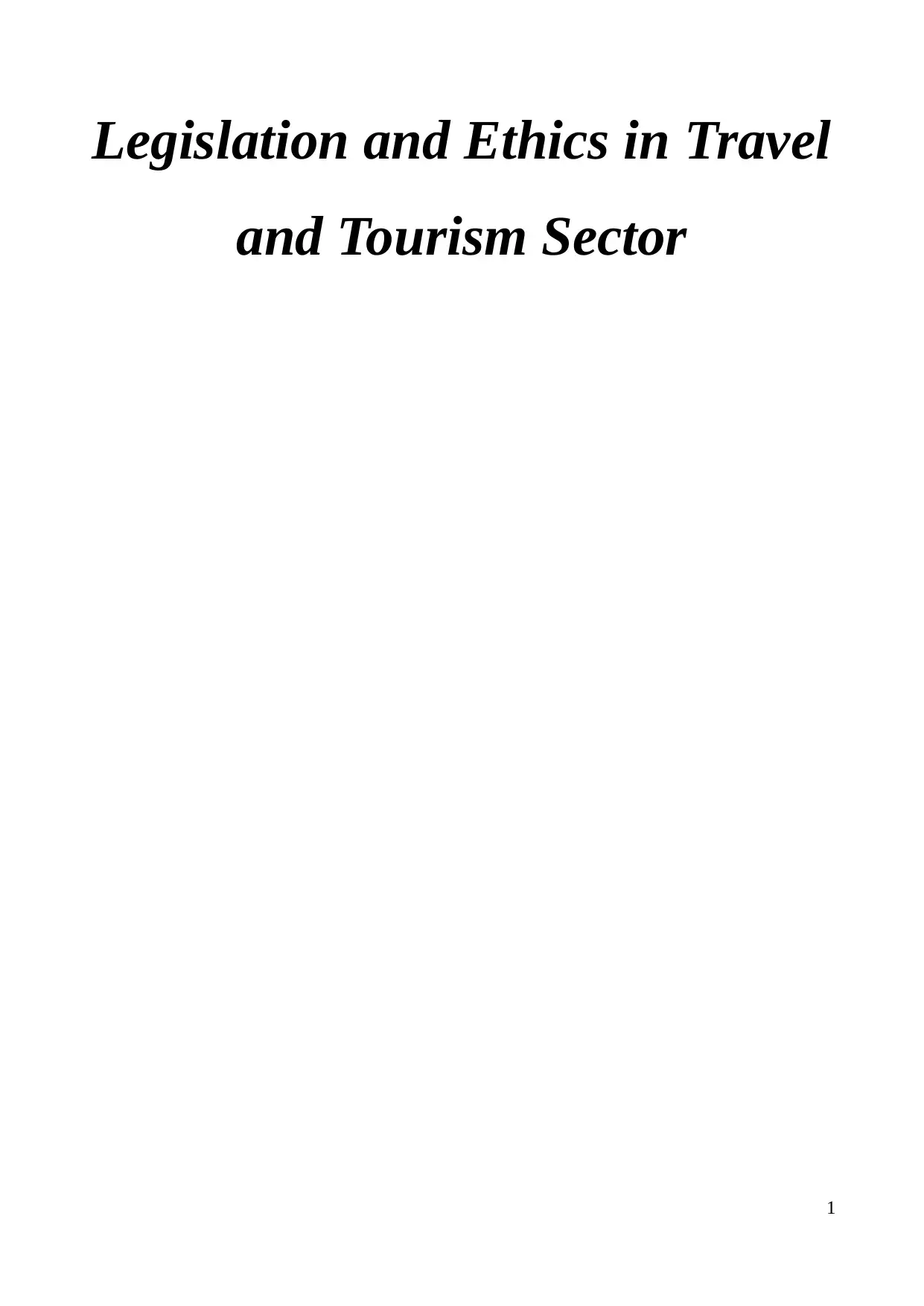
Legislation and Ethics in Travel
and Tourism Sector
1
and Tourism Sector
1
Paraphrase This Document
Need a fresh take? Get an instant paraphrase of this document with our AI Paraphraser
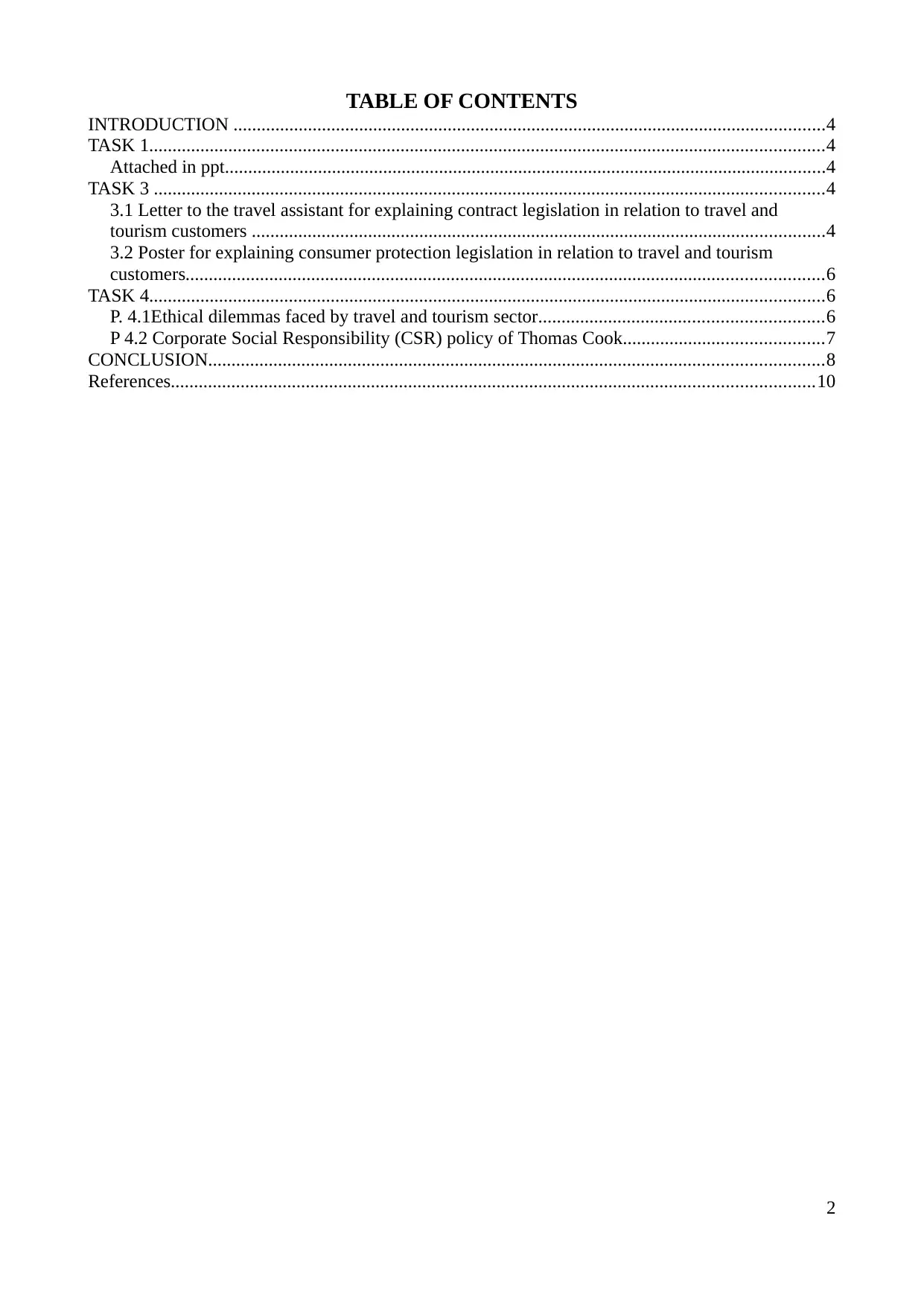
TABLE OF CONTENTS
INTRODUCTION ...............................................................................................................................4
TASK 1.................................................................................................................................................4
Attached in ppt.................................................................................................................................4
TASK 3 ................................................................................................................................................4
3.1 Letter to the travel assistant for explaining contract legislation in relation to travel and
tourism customers ...........................................................................................................................4
3.2 Poster for explaining consumer protection legislation in relation to travel and tourism
customers.........................................................................................................................................6
TASK 4.................................................................................................................................................6
P. 4.1Ethical dilemmas faced by travel and tourism sector.............................................................6
P 4.2 Corporate Social Responsibility (CSR) policy of Thomas Cook...........................................7
CONCLUSION....................................................................................................................................8
References..........................................................................................................................................10
2
INTRODUCTION ...............................................................................................................................4
TASK 1.................................................................................................................................................4
Attached in ppt.................................................................................................................................4
TASK 3 ................................................................................................................................................4
3.1 Letter to the travel assistant for explaining contract legislation in relation to travel and
tourism customers ...........................................................................................................................4
3.2 Poster for explaining consumer protection legislation in relation to travel and tourism
customers.........................................................................................................................................6
TASK 4.................................................................................................................................................6
P. 4.1Ethical dilemmas faced by travel and tourism sector.............................................................6
P 4.2 Corporate Social Responsibility (CSR) policy of Thomas Cook...........................................7
CONCLUSION....................................................................................................................................8
References..........................................................................................................................................10
2
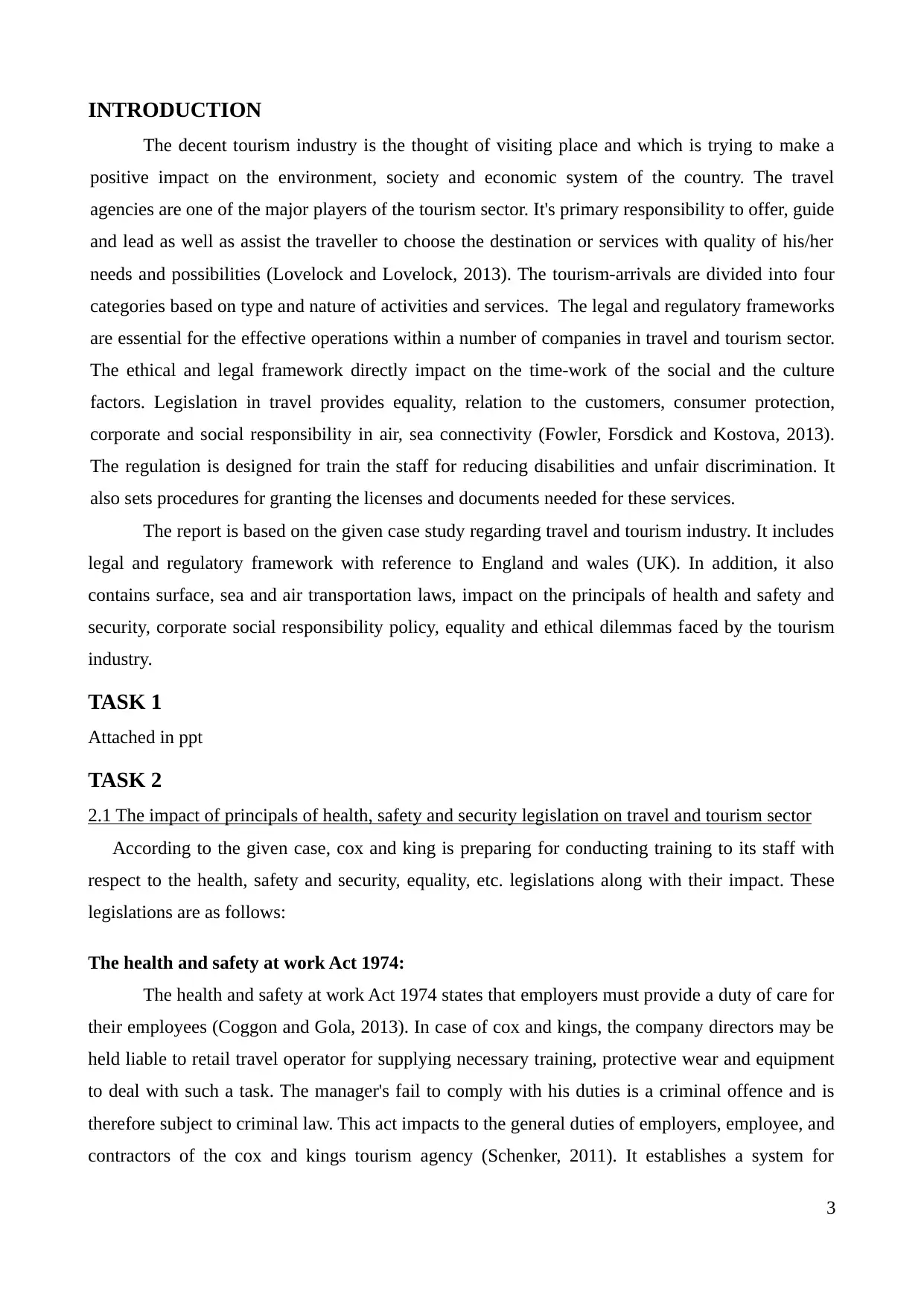
INTRODUCTION
The decent tourism industry is the thought of visiting place and which is trying to make a
positive impact on the environment, society and economic system of the country. The travel
agencies are one of the major players of the tourism sector. It's primary responsibility to offer, guide
and lead as well as assist the traveller to choose the destination or services with quality of his/her
needs and possibilities (Lovelock and Lovelock, 2013). The tourism-arrivals are divided into four
categories based on type and nature of activities and services. The legal and regulatory frameworks
are essential for the effective operations within a number of companies in travel and tourism sector.
The ethical and legal framework directly impact on the time-work of the social and the culture
factors. Legislation in travel provides equality, relation to the customers, consumer protection,
corporate and social responsibility in air, sea connectivity (Fowler, Forsdick and Kostova, 2013).
The regulation is designed for train the staff for reducing disabilities and unfair discrimination. It
also sets procedures for granting the licenses and documents needed for these services.
The report is based on the given case study regarding travel and tourism industry. It includes
legal and regulatory framework with reference to England and wales (UK). In addition, it also
contains surface, sea and air transportation laws, impact on the principals of health and safety and
security, corporate social responsibility policy, equality and ethical dilemmas faced by the tourism
industry.
TASK 1
Attached in ppt
TASK 2
2.1 The impact of principals of health, safety and security legislation on travel and tourism sector
According to the given case, cox and king is preparing for conducting training to its staff with
respect to the health, safety and security, equality, etc. legislations along with their impact. These
legislations are as follows:
The health and safety at work Act 1974:
The health and safety at work Act 1974 states that employers must provide a duty of care for
their employees (Coggon and Gola, 2013). In case of cox and kings, the company directors may be
held liable to retail travel operator for supplying necessary training, protective wear and equipment
to deal with such a task. The manager's fail to comply with his duties is a criminal offence and is
therefore subject to criminal law. This act impacts to the general duties of employers, employee, and
contractors of the cox and kings tourism agency (Schenker, 2011). It establishes a system for
3
The decent tourism industry is the thought of visiting place and which is trying to make a
positive impact on the environment, society and economic system of the country. The travel
agencies are one of the major players of the tourism sector. It's primary responsibility to offer, guide
and lead as well as assist the traveller to choose the destination or services with quality of his/her
needs and possibilities (Lovelock and Lovelock, 2013). The tourism-arrivals are divided into four
categories based on type and nature of activities and services. The legal and regulatory frameworks
are essential for the effective operations within a number of companies in travel and tourism sector.
The ethical and legal framework directly impact on the time-work of the social and the culture
factors. Legislation in travel provides equality, relation to the customers, consumer protection,
corporate and social responsibility in air, sea connectivity (Fowler, Forsdick and Kostova, 2013).
The regulation is designed for train the staff for reducing disabilities and unfair discrimination. It
also sets procedures for granting the licenses and documents needed for these services.
The report is based on the given case study regarding travel and tourism industry. It includes
legal and regulatory framework with reference to England and wales (UK). In addition, it also
contains surface, sea and air transportation laws, impact on the principals of health and safety and
security, corporate social responsibility policy, equality and ethical dilemmas faced by the tourism
industry.
TASK 1
Attached in ppt
TASK 2
2.1 The impact of principals of health, safety and security legislation on travel and tourism sector
According to the given case, cox and king is preparing for conducting training to its staff with
respect to the health, safety and security, equality, etc. legislations along with their impact. These
legislations are as follows:
The health and safety at work Act 1974:
The health and safety at work Act 1974 states that employers must provide a duty of care for
their employees (Coggon and Gola, 2013). In case of cox and kings, the company directors may be
held liable to retail travel operator for supplying necessary training, protective wear and equipment
to deal with such a task. The manager's fail to comply with his duties is a criminal offence and is
therefore subject to criminal law. This act impacts to the general duties of employers, employee, and
contractors of the cox and kings tourism agency (Schenker, 2011). It establishes a system for
3
⊘ This is a preview!⊘
Do you want full access?
Subscribe today to unlock all pages.

Trusted by 1+ million students worldwide
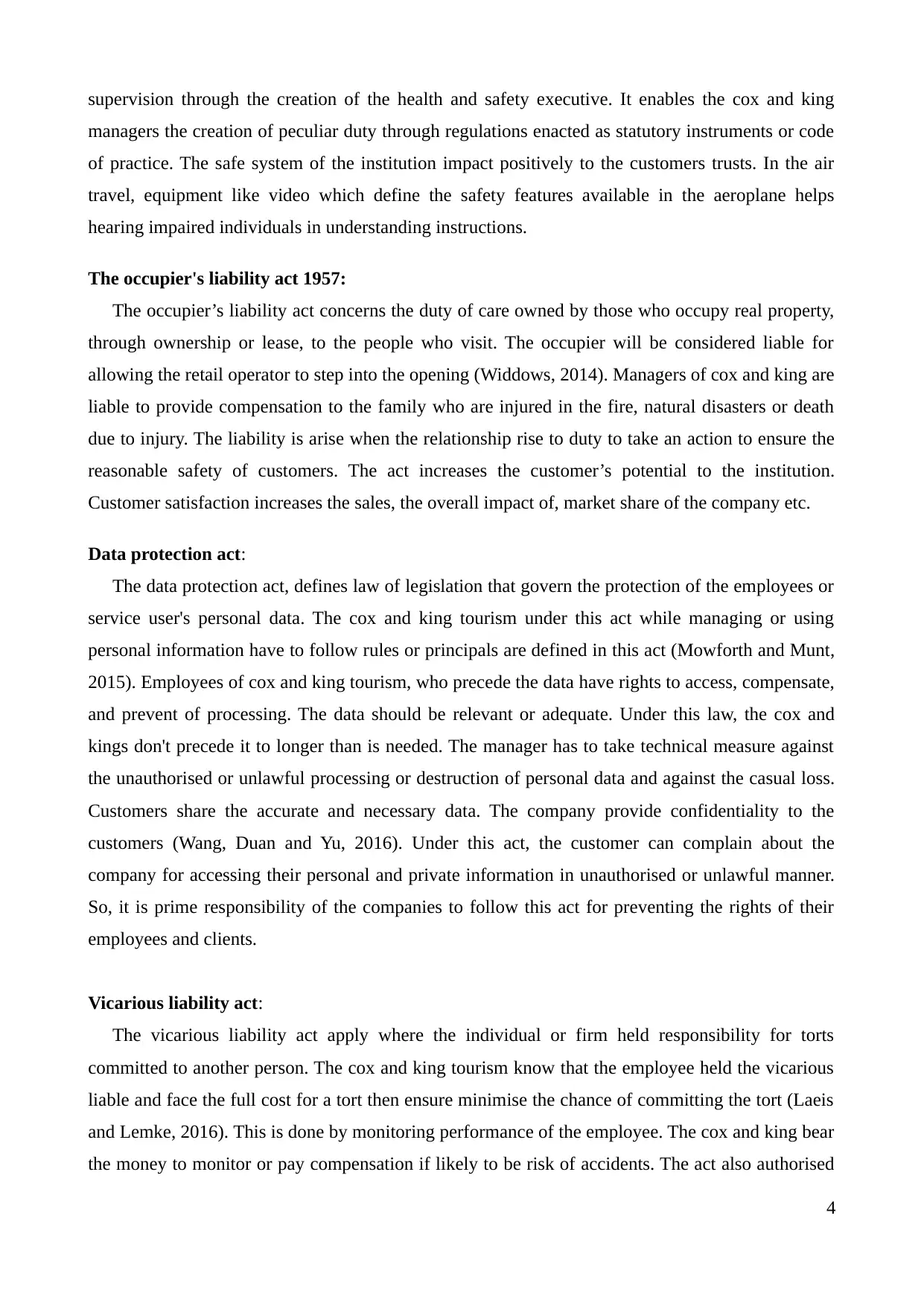
supervision through the creation of the health and safety executive. It enables the cox and king
managers the creation of peculiar duty through regulations enacted as statutory instruments or code
of practice. The safe system of the institution impact positively to the customers trusts. In the air
travel, equipment like video which define the safety features available in the aeroplane helps
hearing impaired individuals in understanding instructions.
The occupier's liability act 1957:
The occupier’s liability act concerns the duty of care owned by those who occupy real property,
through ownership or lease, to the people who visit. The occupier will be considered liable for
allowing the retail operator to step into the opening (Widdows, 2014). Managers of cox and king are
liable to provide compensation to the family who are injured in the fire, natural disasters or death
due to injury. The liability is arise when the relationship rise to duty to take an action to ensure the
reasonable safety of customers. The act increases the customer’s potential to the institution.
Customer satisfaction increases the sales, the overall impact of, market share of the company etc.
Data protection act:
The data protection act, defines law of legislation that govern the protection of the employees or
service user's personal data. The cox and king tourism under this act while managing or using
personal information have to follow rules or principals are defined in this act (Mowforth and Munt,
2015). Employees of cox and king tourism, who precede the data have rights to access, compensate,
and prevent of processing. The data should be relevant or adequate. Under this law, the cox and
kings don't precede it to longer than is needed. The manager has to take technical measure against
the unauthorised or unlawful processing or destruction of personal data and against the casual loss.
Customers share the accurate and necessary data. The company provide confidentiality to the
customers (Wang, Duan and Yu, 2016). Under this act, the customer can complain about the
company for accessing their personal and private information in unauthorised or unlawful manner.
So, it is prime responsibility of the companies to follow this act for preventing the rights of their
employees and clients.
Vicarious liability act:
The vicarious liability act apply where the individual or firm held responsibility for torts
committed to another person. The cox and king tourism know that the employee held the vicarious
liable and face the full cost for a tort then ensure minimise the chance of committing the tort (Laeis
and Lemke, 2016). This is done by monitoring performance of the employee. The cox and king bear
the money to monitor or pay compensation if likely to be risk of accidents. The act also authorised
4
managers the creation of peculiar duty through regulations enacted as statutory instruments or code
of practice. The safe system of the institution impact positively to the customers trusts. In the air
travel, equipment like video which define the safety features available in the aeroplane helps
hearing impaired individuals in understanding instructions.
The occupier's liability act 1957:
The occupier’s liability act concerns the duty of care owned by those who occupy real property,
through ownership or lease, to the people who visit. The occupier will be considered liable for
allowing the retail operator to step into the opening (Widdows, 2014). Managers of cox and king are
liable to provide compensation to the family who are injured in the fire, natural disasters or death
due to injury. The liability is arise when the relationship rise to duty to take an action to ensure the
reasonable safety of customers. The act increases the customer’s potential to the institution.
Customer satisfaction increases the sales, the overall impact of, market share of the company etc.
Data protection act:
The data protection act, defines law of legislation that govern the protection of the employees or
service user's personal data. The cox and king tourism under this act while managing or using
personal information have to follow rules or principals are defined in this act (Mowforth and Munt,
2015). Employees of cox and king tourism, who precede the data have rights to access, compensate,
and prevent of processing. The data should be relevant or adequate. Under this law, the cox and
kings don't precede it to longer than is needed. The manager has to take technical measure against
the unauthorised or unlawful processing or destruction of personal data and against the casual loss.
Customers share the accurate and necessary data. The company provide confidentiality to the
customers (Wang, Duan and Yu, 2016). Under this act, the customer can complain about the
company for accessing their personal and private information in unauthorised or unlawful manner.
So, it is prime responsibility of the companies to follow this act for preventing the rights of their
employees and clients.
Vicarious liability act:
The vicarious liability act apply where the individual or firm held responsibility for torts
committed to another person. The cox and king tourism know that the employee held the vicarious
liable and face the full cost for a tort then ensure minimise the chance of committing the tort (Laeis
and Lemke, 2016). This is done by monitoring performance of the employee. The cox and king bear
the money to monitor or pay compensation if likely to be risk of accidents. The act also authorised
4
Paraphrase This Document
Need a fresh take? Get an instant paraphrase of this document with our AI Paraphraser
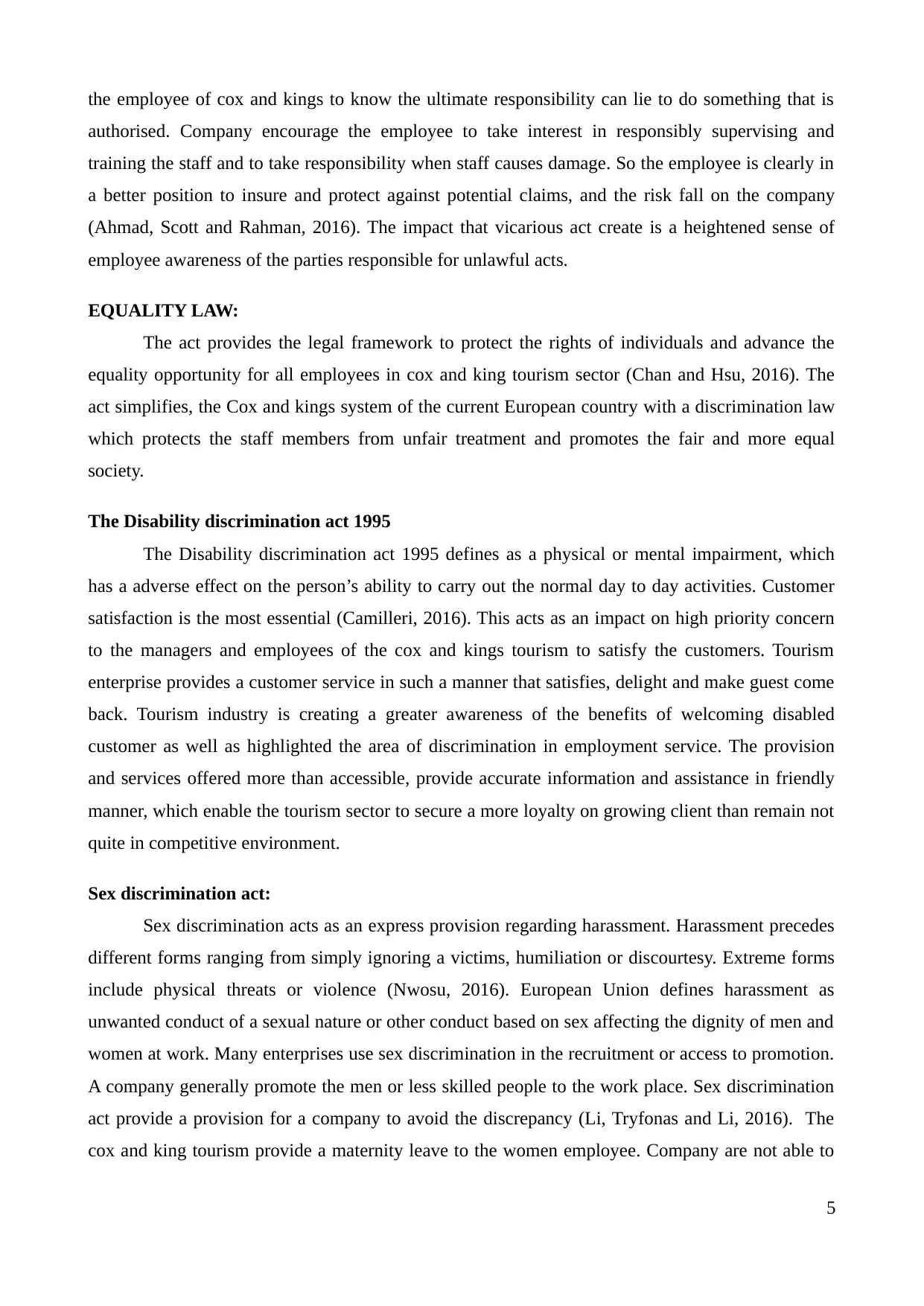
the employee of cox and kings to know the ultimate responsibility can lie to do something that is
authorised. Company encourage the employee to take interest in responsibly supervising and
training the staff and to take responsibility when staff causes damage. So the employee is clearly in
a better position to insure and protect against potential claims, and the risk fall on the company
(Ahmad, Scott and Rahman, 2016). The impact that vicarious act create is a heightened sense of
employee awareness of the parties responsible for unlawful acts.
EQUALITY LAW:
The act provides the legal framework to protect the rights of individuals and advance the
equality opportunity for all employees in cox and king tourism sector (Chan and Hsu, 2016). The
act simplifies, the Cox and kings system of the current European country with a discrimination law
which protects the staff members from unfair treatment and promotes the fair and more equal
society.
The Disability discrimination act 1995
The Disability discrimination act 1995 defines as a physical or mental impairment, which
has a adverse effect on the person’s ability to carry out the normal day to day activities. Customer
satisfaction is the most essential (Camilleri, 2016). This acts as an impact on high priority concern
to the managers and employees of the cox and kings tourism to satisfy the customers. Tourism
enterprise provides a customer service in such a manner that satisfies, delight and make guest come
back. Tourism industry is creating a greater awareness of the benefits of welcoming disabled
customer as well as highlighted the area of discrimination in employment service. The provision
and services offered more than accessible, provide accurate information and assistance in friendly
manner, which enable the tourism sector to secure a more loyalty on growing client than remain not
quite in competitive environment.
Sex discrimination act:
Sex discrimination acts as an express provision regarding harassment. Harassment precedes
different forms ranging from simply ignoring a victims, humiliation or discourtesy. Extreme forms
include physical threats or violence (Nwosu, 2016). European Union defines harassment as
unwanted conduct of a sexual nature or other conduct based on sex affecting the dignity of men and
women at work. Many enterprises use sex discrimination in the recruitment or access to promotion.
A company generally promote the men or less skilled people to the work place. Sex discrimination
act provide a provision for a company to avoid the discrepancy (Li, Tryfonas and Li, 2016). The
cox and king tourism provide a maternity leave to the women employee. Company are not able to
5
authorised. Company encourage the employee to take interest in responsibly supervising and
training the staff and to take responsibility when staff causes damage. So the employee is clearly in
a better position to insure and protect against potential claims, and the risk fall on the company
(Ahmad, Scott and Rahman, 2016). The impact that vicarious act create is a heightened sense of
employee awareness of the parties responsible for unlawful acts.
EQUALITY LAW:
The act provides the legal framework to protect the rights of individuals and advance the
equality opportunity for all employees in cox and king tourism sector (Chan and Hsu, 2016). The
act simplifies, the Cox and kings system of the current European country with a discrimination law
which protects the staff members from unfair treatment and promotes the fair and more equal
society.
The Disability discrimination act 1995
The Disability discrimination act 1995 defines as a physical or mental impairment, which
has a adverse effect on the person’s ability to carry out the normal day to day activities. Customer
satisfaction is the most essential (Camilleri, 2016). This acts as an impact on high priority concern
to the managers and employees of the cox and kings tourism to satisfy the customers. Tourism
enterprise provides a customer service in such a manner that satisfies, delight and make guest come
back. Tourism industry is creating a greater awareness of the benefits of welcoming disabled
customer as well as highlighted the area of discrimination in employment service. The provision
and services offered more than accessible, provide accurate information and assistance in friendly
manner, which enable the tourism sector to secure a more loyalty on growing client than remain not
quite in competitive environment.
Sex discrimination act:
Sex discrimination acts as an express provision regarding harassment. Harassment precedes
different forms ranging from simply ignoring a victims, humiliation or discourtesy. Extreme forms
include physical threats or violence (Nwosu, 2016). European Union defines harassment as
unwanted conduct of a sexual nature or other conduct based on sex affecting the dignity of men and
women at work. Many enterprises use sex discrimination in the recruitment or access to promotion.
A company generally promote the men or less skilled people to the work place. Sex discrimination
act provide a provision for a company to avoid the discrepancy (Li, Tryfonas and Li, 2016). The
cox and king tourism provide a maternity leave to the women employee. Company are not able to
5
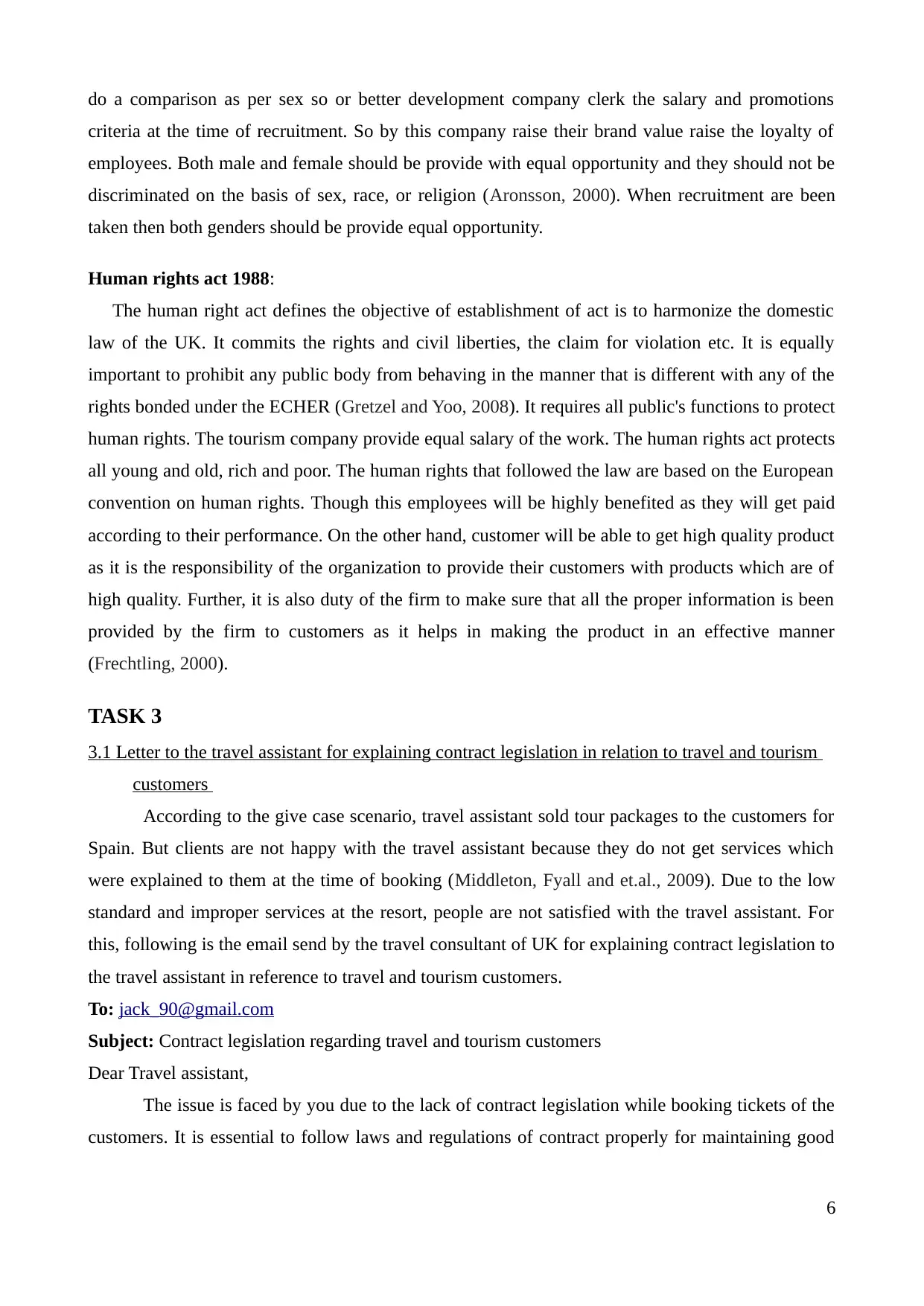
do a comparison as per sex so or better development company clerk the salary and promotions
criteria at the time of recruitment. So by this company raise their brand value raise the loyalty of
employees. Both male and female should be provide with equal opportunity and they should not be
discriminated on the basis of sex, race, or religion (Aronsson, 2000). When recruitment are been
taken then both genders should be provide equal opportunity.
Human rights act 1988:
The human right act defines the objective of establishment of act is to harmonize the domestic
law of the UK. It commits the rights and civil liberties, the claim for violation etc. It is equally
important to prohibit any public body from behaving in the manner that is different with any of the
rights bonded under the ECHER (Gretzel and Yoo, 2008). It requires all public's functions to protect
human rights. The tourism company provide equal salary of the work. The human rights act protects
all young and old, rich and poor. The human rights that followed the law are based on the European
convention on human rights. Though this employees will be highly benefited as they will get paid
according to their performance. On the other hand, customer will be able to get high quality product
as it is the responsibility of the organization to provide their customers with products which are of
high quality. Further, it is also duty of the firm to make sure that all the proper information is been
provided by the firm to customers as it helps in making the product in an effective manner
(Frechtling, 2000).
TASK 3
3.1 Letter to the travel assistant for explaining contract legislation in relation to travel and tourism
customers
According to the give case scenario, travel assistant sold tour packages to the customers for
Spain. But clients are not happy with the travel assistant because they do not get services which
were explained to them at the time of booking (Middleton, Fyall and et.al., 2009). Due to the low
standard and improper services at the resort, people are not satisfied with the travel assistant. For
this, following is the email send by the travel consultant of UK for explaining contract legislation to
the travel assistant in reference to travel and tourism customers.
To: jack_90@gmail.com
Subject: Contract legislation regarding travel and tourism customers
Dear Travel assistant,
The issue is faced by you due to the lack of contract legislation while booking tickets of the
customers. It is essential to follow laws and regulations of contract properly for maintaining good
6
criteria at the time of recruitment. So by this company raise their brand value raise the loyalty of
employees. Both male and female should be provide with equal opportunity and they should not be
discriminated on the basis of sex, race, or religion (Aronsson, 2000). When recruitment are been
taken then both genders should be provide equal opportunity.
Human rights act 1988:
The human right act defines the objective of establishment of act is to harmonize the domestic
law of the UK. It commits the rights and civil liberties, the claim for violation etc. It is equally
important to prohibit any public body from behaving in the manner that is different with any of the
rights bonded under the ECHER (Gretzel and Yoo, 2008). It requires all public's functions to protect
human rights. The tourism company provide equal salary of the work. The human rights act protects
all young and old, rich and poor. The human rights that followed the law are based on the European
convention on human rights. Though this employees will be highly benefited as they will get paid
according to their performance. On the other hand, customer will be able to get high quality product
as it is the responsibility of the organization to provide their customers with products which are of
high quality. Further, it is also duty of the firm to make sure that all the proper information is been
provided by the firm to customers as it helps in making the product in an effective manner
(Frechtling, 2000).
TASK 3
3.1 Letter to the travel assistant for explaining contract legislation in relation to travel and tourism
customers
According to the give case scenario, travel assistant sold tour packages to the customers for
Spain. But clients are not happy with the travel assistant because they do not get services which
were explained to them at the time of booking (Middleton, Fyall and et.al., 2009). Due to the low
standard and improper services at the resort, people are not satisfied with the travel assistant. For
this, following is the email send by the travel consultant of UK for explaining contract legislation to
the travel assistant in reference to travel and tourism customers.
To: jack_90@gmail.com
Subject: Contract legislation regarding travel and tourism customers
Dear Travel assistant,
The issue is faced by you due to the lack of contract legislation while booking tickets of the
customers. It is essential to follow laws and regulations of contract properly for maintaining good
6
⊘ This is a preview!⊘
Do you want full access?
Subscribe today to unlock all pages.

Trusted by 1+ million students worldwide
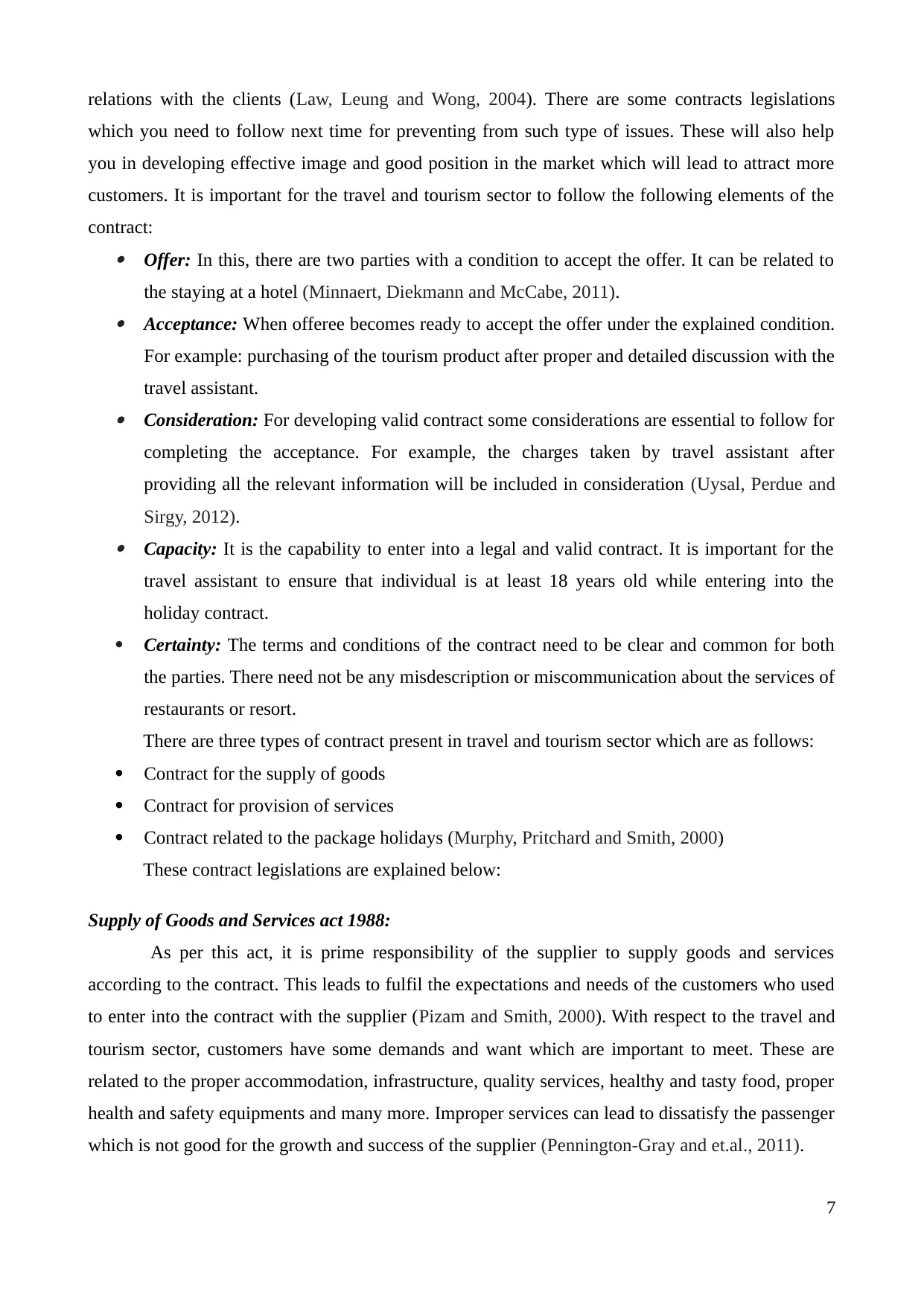
relations with the clients (Law, Leung and Wong, 2004). There are some contracts legislations
which you need to follow next time for preventing from such type of issues. These will also help
you in developing effective image and good position in the market which will lead to attract more
customers. It is important for the travel and tourism sector to follow the following elements of the
contract: Offer: In this, there are two parties with a condition to accept the offer. It can be related to
the staying at a hotel (Minnaert, Diekmann and McCabe, 2011). Acceptance: When offeree becomes ready to accept the offer under the explained condition.
For example: purchasing of the tourism product after proper and detailed discussion with the
travel assistant. Consideration: For developing valid contract some considerations are essential to follow for
completing the acceptance. For example, the charges taken by travel assistant after
providing all the relevant information will be included in consideration (Uysal, Perdue and
Sirgy, 2012). Capacity: It is the capability to enter into a legal and valid contract. It is important for the
travel assistant to ensure that individual is at least 18 years old while entering into the
holiday contract.
Certainty: The terms and conditions of the contract need to be clear and common for both
the parties. There need not be any misdescription or miscommunication about the services of
restaurants or resort.
There are three types of contract present in travel and tourism sector which are as follows:
Contract for the supply of goods
Contract for provision of services
Contract related to the package holidays (Murphy, Pritchard and Smith, 2000)
These contract legislations are explained below:
Supply of Goods and Services act 1988:
As per this act, it is prime responsibility of the supplier to supply goods and services
according to the contract. This leads to fulfil the expectations and needs of the customers who used
to enter into the contract with the supplier (Pizam and Smith, 2000). With respect to the travel and
tourism sector, customers have some demands and want which are important to meet. These are
related to the proper accommodation, infrastructure, quality services, healthy and tasty food, proper
health and safety equipments and many more. Improper services can lead to dissatisfy the passenger
which is not good for the growth and success of the supplier (Pennington-Gray and et.al., 2011).
7
which you need to follow next time for preventing from such type of issues. These will also help
you in developing effective image and good position in the market which will lead to attract more
customers. It is important for the travel and tourism sector to follow the following elements of the
contract: Offer: In this, there are two parties with a condition to accept the offer. It can be related to
the staying at a hotel (Minnaert, Diekmann and McCabe, 2011). Acceptance: When offeree becomes ready to accept the offer under the explained condition.
For example: purchasing of the tourism product after proper and detailed discussion with the
travel assistant. Consideration: For developing valid contract some considerations are essential to follow for
completing the acceptance. For example, the charges taken by travel assistant after
providing all the relevant information will be included in consideration (Uysal, Perdue and
Sirgy, 2012). Capacity: It is the capability to enter into a legal and valid contract. It is important for the
travel assistant to ensure that individual is at least 18 years old while entering into the
holiday contract.
Certainty: The terms and conditions of the contract need to be clear and common for both
the parties. There need not be any misdescription or miscommunication about the services of
restaurants or resort.
There are three types of contract present in travel and tourism sector which are as follows:
Contract for the supply of goods
Contract for provision of services
Contract related to the package holidays (Murphy, Pritchard and Smith, 2000)
These contract legislations are explained below:
Supply of Goods and Services act 1988:
As per this act, it is prime responsibility of the supplier to supply goods and services
according to the contract. This leads to fulfil the expectations and needs of the customers who used
to enter into the contract with the supplier (Pizam and Smith, 2000). With respect to the travel and
tourism sector, customers have some demands and want which are important to meet. These are
related to the proper accommodation, infrastructure, quality services, healthy and tasty food, proper
health and safety equipments and many more. Improper services can lead to dissatisfy the passenger
which is not good for the growth and success of the supplier (Pennington-Gray and et.al., 2011).
7
Paraphrase This Document
Need a fresh take? Get an instant paraphrase of this document with our AI Paraphraser
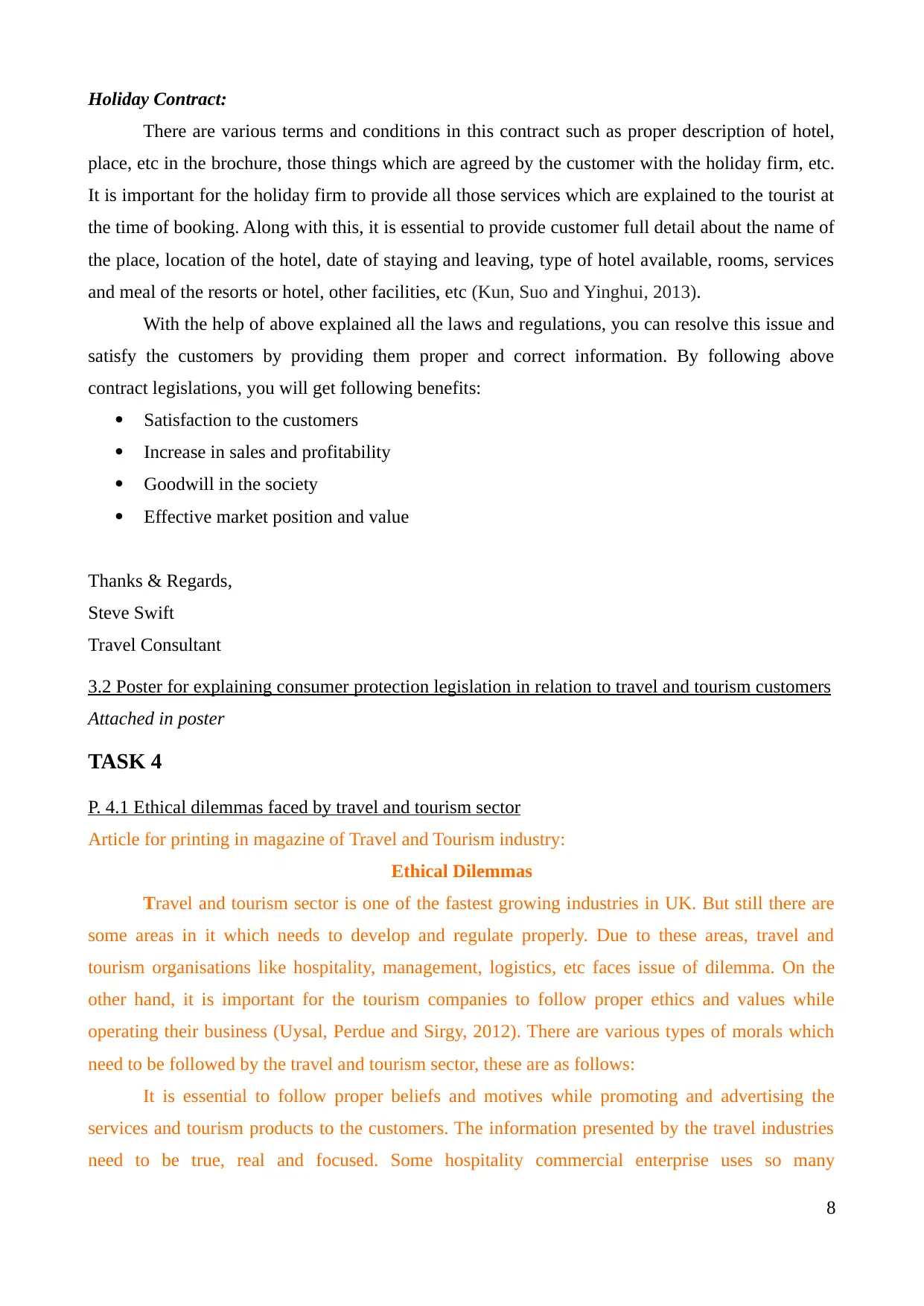
Holiday Contract:
There are various terms and conditions in this contract such as proper description of hotel,
place, etc in the brochure, those things which are agreed by the customer with the holiday firm, etc.
It is important for the holiday firm to provide all those services which are explained to the tourist at
the time of booking. Along with this, it is essential to provide customer full detail about the name of
the place, location of the hotel, date of staying and leaving, type of hotel available, rooms, services
and meal of the resorts or hotel, other facilities, etc (Kun, Suo and Yinghui, 2013).
With the help of above explained all the laws and regulations, you can resolve this issue and
satisfy the customers by providing them proper and correct information. By following above
contract legislations, you will get following benefits:
Satisfaction to the customers
Increase in sales and profitability
Goodwill in the society
Effective market position and value
Thanks & Regards,
Steve Swift
Travel Consultant
3.2 Poster for explaining consumer protection legislation in relation to travel and tourism customers
Attached in poster
TASK 4
P. 4.1 Ethical dilemmas faced by travel and tourism sector
Article for printing in magazine of Travel and Tourism industry:
Ethical Dilemmas
Travel and tourism sector is one of the fastest growing industries in UK. But still there are
some areas in it which needs to develop and regulate properly. Due to these areas, travel and
tourism organisations like hospitality, management, logistics, etc faces issue of dilemma. On the
other hand, it is important for the tourism companies to follow proper ethics and values while
operating their business (Uysal, Perdue and Sirgy, 2012). There are various types of morals which
need to be followed by the travel and tourism sector, these are as follows:
It is essential to follow proper beliefs and motives while promoting and advertising the
services and tourism products to the customers. The information presented by the travel industries
need to be true, real and focused. Some hospitality commercial enterprise uses so many
8
There are various terms and conditions in this contract such as proper description of hotel,
place, etc in the brochure, those things which are agreed by the customer with the holiday firm, etc.
It is important for the holiday firm to provide all those services which are explained to the tourist at
the time of booking. Along with this, it is essential to provide customer full detail about the name of
the place, location of the hotel, date of staying and leaving, type of hotel available, rooms, services
and meal of the resorts or hotel, other facilities, etc (Kun, Suo and Yinghui, 2013).
With the help of above explained all the laws and regulations, you can resolve this issue and
satisfy the customers by providing them proper and correct information. By following above
contract legislations, you will get following benefits:
Satisfaction to the customers
Increase in sales and profitability
Goodwill in the society
Effective market position and value
Thanks & Regards,
Steve Swift
Travel Consultant
3.2 Poster for explaining consumer protection legislation in relation to travel and tourism customers
Attached in poster
TASK 4
P. 4.1 Ethical dilemmas faced by travel and tourism sector
Article for printing in magazine of Travel and Tourism industry:
Ethical Dilemmas
Travel and tourism sector is one of the fastest growing industries in UK. But still there are
some areas in it which needs to develop and regulate properly. Due to these areas, travel and
tourism organisations like hospitality, management, logistics, etc faces issue of dilemma. On the
other hand, it is important for the tourism companies to follow proper ethics and values while
operating their business (Uysal, Perdue and Sirgy, 2012). There are various types of morals which
need to be followed by the travel and tourism sector, these are as follows:
It is essential to follow proper beliefs and motives while promoting and advertising the
services and tourism products to the customers. The information presented by the travel industries
need to be true, real and focused. Some hospitality commercial enterprise uses so many
8
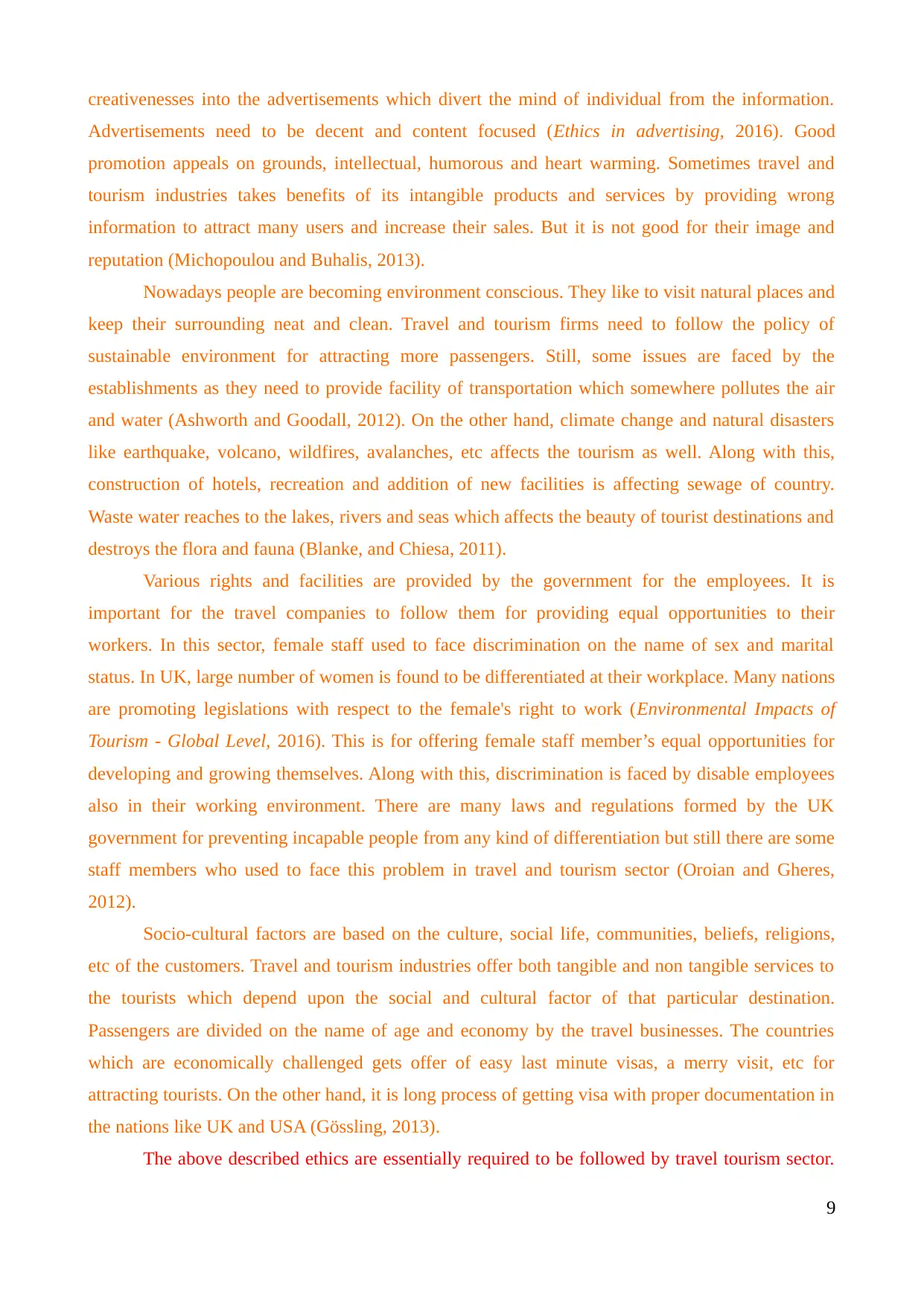
creativenesses into the advertisements which divert the mind of individual from the information.
Advertisements need to be decent and content focused (Ethics in advertising, 2016). Good
promotion appeals on grounds, intellectual, humorous and heart warming. Sometimes travel and
tourism industries takes benefits of its intangible products and services by providing wrong
information to attract many users and increase their sales. But it is not good for their image and
reputation (Michopoulou and Buhalis, 2013).
Nowadays people are becoming environment conscious. They like to visit natural places and
keep their surrounding neat and clean. Travel and tourism firms need to follow the policy of
sustainable environment for attracting more passengers. Still, some issues are faced by the
establishments as they need to provide facility of transportation which somewhere pollutes the air
and water (Ashworth and Goodall, 2012). On the other hand, climate change and natural disasters
like earthquake, volcano, wildfires, avalanches, etc affects the tourism as well. Along with this,
construction of hotels, recreation and addition of new facilities is affecting sewage of country.
Waste water reaches to the lakes, rivers and seas which affects the beauty of tourist destinations and
destroys the flora and fauna (Blanke, and Chiesa, 2011).
Various rights and facilities are provided by the government for the employees. It is
important for the travel companies to follow them for providing equal opportunities to their
workers. In this sector, female staff used to face discrimination on the name of sex and marital
status. In UK, large number of women is found to be differentiated at their workplace. Many nations
are promoting legislations with respect to the female's right to work (Environmental Impacts of
Tourism - Global Level, 2016). This is for offering female staff member’s equal opportunities for
developing and growing themselves. Along with this, discrimination is faced by disable employees
also in their working environment. There are many laws and regulations formed by the UK
government for preventing incapable people from any kind of differentiation but still there are some
staff members who used to face this problem in travel and tourism sector (Oroian and Gheres,
2012).
Socio-cultural factors are based on the culture, social life, communities, beliefs, religions,
etc of the customers. Travel and tourism industries offer both tangible and non tangible services to
the tourists which depend upon the social and cultural factor of that particular destination.
Passengers are divided on the name of age and economy by the travel businesses. The countries
which are economically challenged gets offer of easy last minute visas, a merry visit, etc for
attracting tourists. On the other hand, it is long process of getting visa with proper documentation in
the nations like UK and USA (Gössling, 2013).
The above described ethics are essentially required to be followed by travel tourism sector.
9
Advertisements need to be decent and content focused (Ethics in advertising, 2016). Good
promotion appeals on grounds, intellectual, humorous and heart warming. Sometimes travel and
tourism industries takes benefits of its intangible products and services by providing wrong
information to attract many users and increase their sales. But it is not good for their image and
reputation (Michopoulou and Buhalis, 2013).
Nowadays people are becoming environment conscious. They like to visit natural places and
keep their surrounding neat and clean. Travel and tourism firms need to follow the policy of
sustainable environment for attracting more passengers. Still, some issues are faced by the
establishments as they need to provide facility of transportation which somewhere pollutes the air
and water (Ashworth and Goodall, 2012). On the other hand, climate change and natural disasters
like earthquake, volcano, wildfires, avalanches, etc affects the tourism as well. Along with this,
construction of hotels, recreation and addition of new facilities is affecting sewage of country.
Waste water reaches to the lakes, rivers and seas which affects the beauty of tourist destinations and
destroys the flora and fauna (Blanke, and Chiesa, 2011).
Various rights and facilities are provided by the government for the employees. It is
important for the travel companies to follow them for providing equal opportunities to their
workers. In this sector, female staff used to face discrimination on the name of sex and marital
status. In UK, large number of women is found to be differentiated at their workplace. Many nations
are promoting legislations with respect to the female's right to work (Environmental Impacts of
Tourism - Global Level, 2016). This is for offering female staff member’s equal opportunities for
developing and growing themselves. Along with this, discrimination is faced by disable employees
also in their working environment. There are many laws and regulations formed by the UK
government for preventing incapable people from any kind of differentiation but still there are some
staff members who used to face this problem in travel and tourism sector (Oroian and Gheres,
2012).
Socio-cultural factors are based on the culture, social life, communities, beliefs, religions,
etc of the customers. Travel and tourism industries offer both tangible and non tangible services to
the tourists which depend upon the social and cultural factor of that particular destination.
Passengers are divided on the name of age and economy by the travel businesses. The countries
which are economically challenged gets offer of easy last minute visas, a merry visit, etc for
attracting tourists. On the other hand, it is long process of getting visa with proper documentation in
the nations like UK and USA (Gössling, 2013).
The above described ethics are essentially required to be followed by travel tourism sector.
9
⊘ This is a preview!⊘
Do you want full access?
Subscribe today to unlock all pages.

Trusted by 1+ million students worldwide
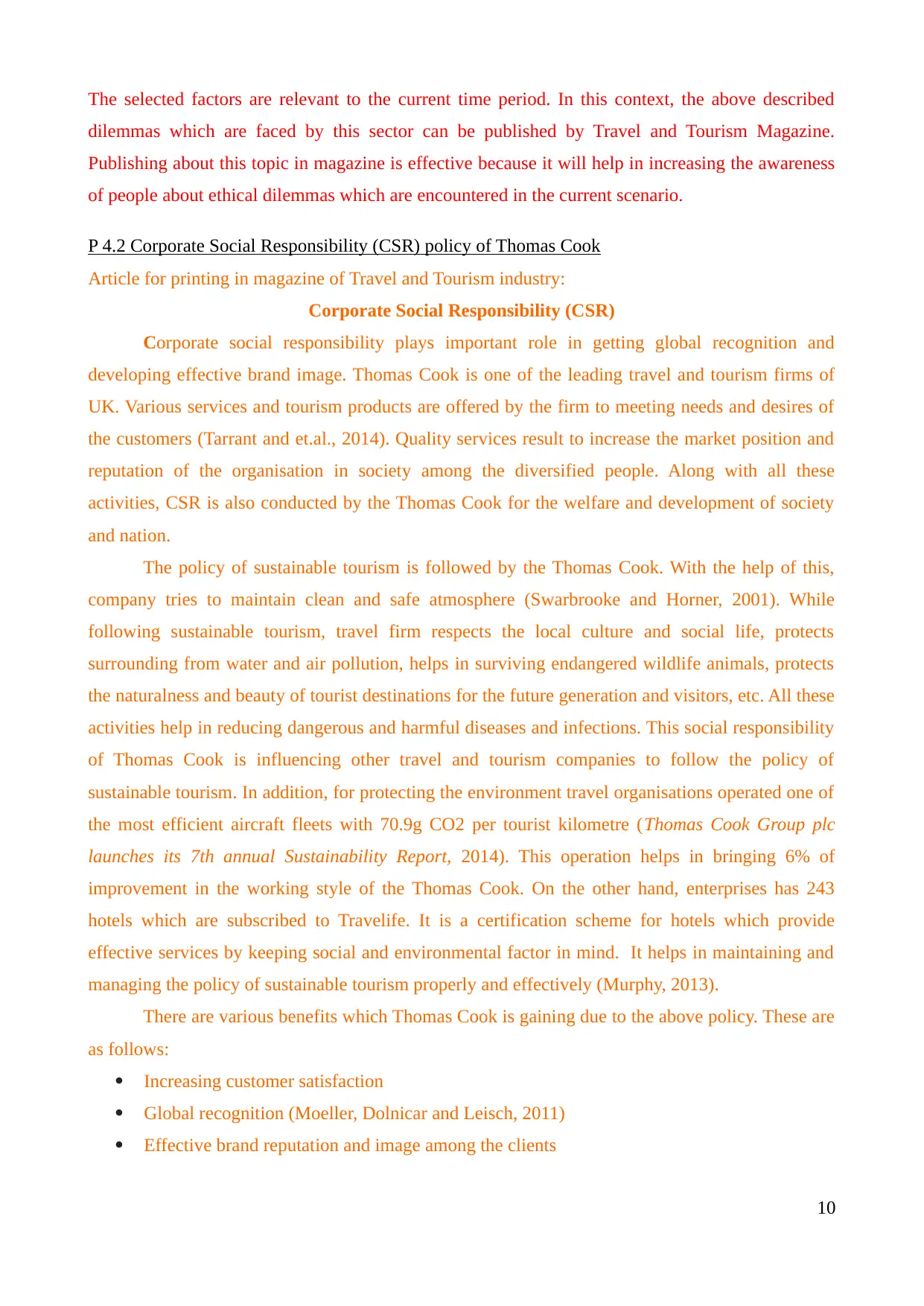
The selected factors are relevant to the current time period. In this context, the above described
dilemmas which are faced by this sector can be published by Travel and Tourism Magazine.
Publishing about this topic in magazine is effective because it will help in increasing the awareness
of people about ethical dilemmas which are encountered in the current scenario.
P 4.2 Corporate Social Responsibility (CSR) policy of Thomas Cook
Article for printing in magazine of Travel and Tourism industry:
Corporate Social Responsibility (CSR)
Corporate social responsibility plays important role in getting global recognition and
developing effective brand image. Thomas Cook is one of the leading travel and tourism firms of
UK. Various services and tourism products are offered by the firm to meeting needs and desires of
the customers (Tarrant and et.al., 2014). Quality services result to increase the market position and
reputation of the organisation in society among the diversified people. Along with all these
activities, CSR is also conducted by the Thomas Cook for the welfare and development of society
and nation.
The policy of sustainable tourism is followed by the Thomas Cook. With the help of this,
company tries to maintain clean and safe atmosphere (Swarbrooke and Horner, 2001). While
following sustainable tourism, travel firm respects the local culture and social life, protects
surrounding from water and air pollution, helps in surviving endangered wildlife animals, protects
the naturalness and beauty of tourist destinations for the future generation and visitors, etc. All these
activities help in reducing dangerous and harmful diseases and infections. This social responsibility
of Thomas Cook is influencing other travel and tourism companies to follow the policy of
sustainable tourism. In addition, for protecting the environment travel organisations operated one of
the most efficient aircraft fleets with 70.9g CO2 per tourist kilometre (Thomas Cook Group plc
launches its 7th annual Sustainability Report, 2014). This operation helps in bringing 6% of
improvement in the working style of the Thomas Cook. On the other hand, enterprises has 243
hotels which are subscribed to Travelife. It is a certification scheme for hotels which provide
effective services by keeping social and environmental factor in mind. It helps in maintaining and
managing the policy of sustainable tourism properly and effectively (Murphy, 2013).
There are various benefits which Thomas Cook is gaining due to the above policy. These are
as follows:
Increasing customer satisfaction
Global recognition (Moeller, Dolnicar and Leisch, 2011)
Effective brand reputation and image among the clients
10
dilemmas which are faced by this sector can be published by Travel and Tourism Magazine.
Publishing about this topic in magazine is effective because it will help in increasing the awareness
of people about ethical dilemmas which are encountered in the current scenario.
P 4.2 Corporate Social Responsibility (CSR) policy of Thomas Cook
Article for printing in magazine of Travel and Tourism industry:
Corporate Social Responsibility (CSR)
Corporate social responsibility plays important role in getting global recognition and
developing effective brand image. Thomas Cook is one of the leading travel and tourism firms of
UK. Various services and tourism products are offered by the firm to meeting needs and desires of
the customers (Tarrant and et.al., 2014). Quality services result to increase the market position and
reputation of the organisation in society among the diversified people. Along with all these
activities, CSR is also conducted by the Thomas Cook for the welfare and development of society
and nation.
The policy of sustainable tourism is followed by the Thomas Cook. With the help of this,
company tries to maintain clean and safe atmosphere (Swarbrooke and Horner, 2001). While
following sustainable tourism, travel firm respects the local culture and social life, protects
surrounding from water and air pollution, helps in surviving endangered wildlife animals, protects
the naturalness and beauty of tourist destinations for the future generation and visitors, etc. All these
activities help in reducing dangerous and harmful diseases and infections. This social responsibility
of Thomas Cook is influencing other travel and tourism companies to follow the policy of
sustainable tourism. In addition, for protecting the environment travel organisations operated one of
the most efficient aircraft fleets with 70.9g CO2 per tourist kilometre (Thomas Cook Group plc
launches its 7th annual Sustainability Report, 2014). This operation helps in bringing 6% of
improvement in the working style of the Thomas Cook. On the other hand, enterprises has 243
hotels which are subscribed to Travelife. It is a certification scheme for hotels which provide
effective services by keeping social and environmental factor in mind. It helps in maintaining and
managing the policy of sustainable tourism properly and effectively (Murphy, 2013).
There are various benefits which Thomas Cook is gaining due to the above policy. These are
as follows:
Increasing customer satisfaction
Global recognition (Moeller, Dolnicar and Leisch, 2011)
Effective brand reputation and image among the clients
10
Paraphrase This Document
Need a fresh take? Get an instant paraphrase of this document with our AI Paraphraser
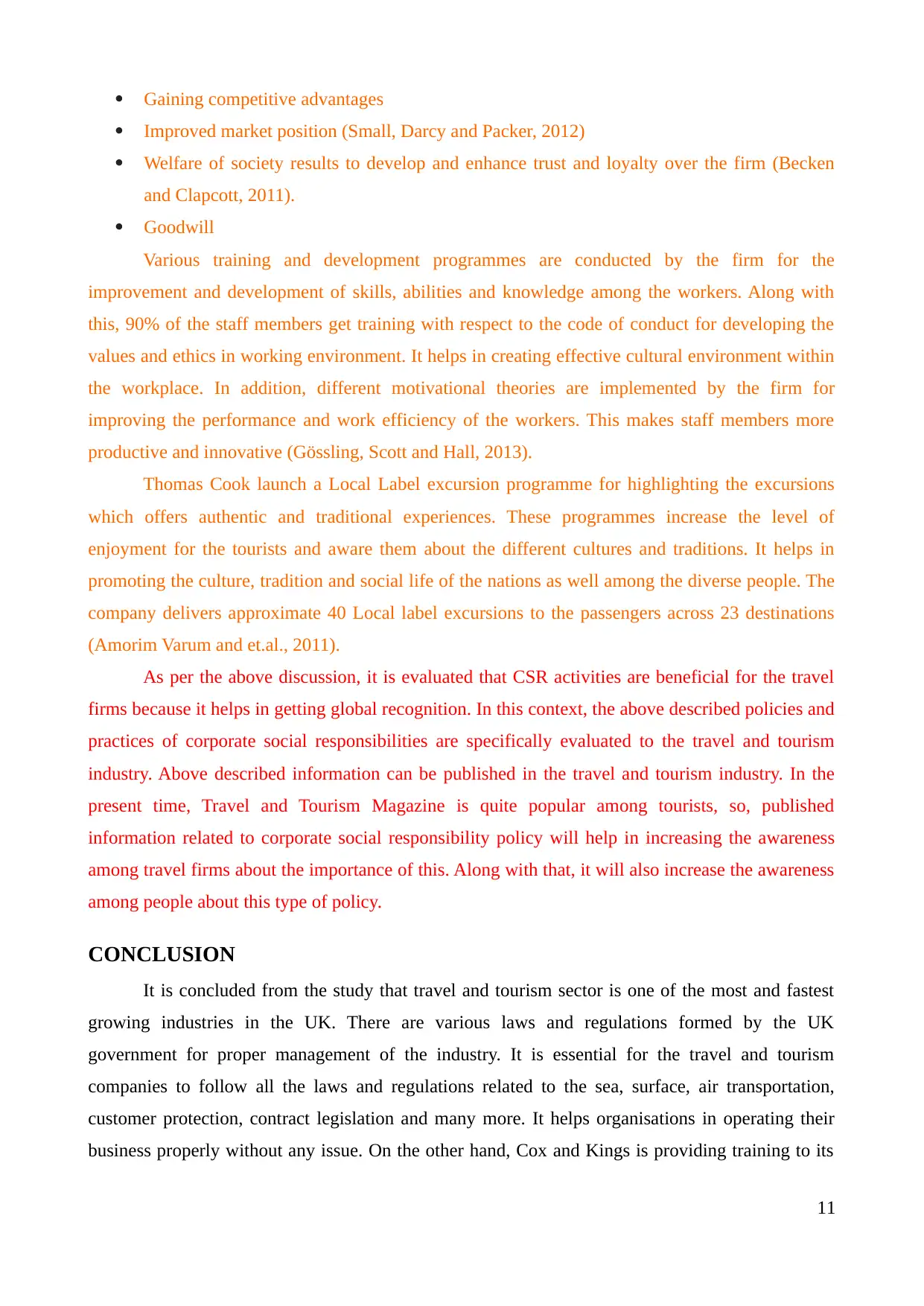
Gaining competitive advantages
Improved market position (Small, Darcy and Packer, 2012)
Welfare of society results to develop and enhance trust and loyalty over the firm (Becken
and Clapcott, 2011).
Goodwill
Various training and development programmes are conducted by the firm for the
improvement and development of skills, abilities and knowledge among the workers. Along with
this, 90% of the staff members get training with respect to the code of conduct for developing the
values and ethics in working environment. It helps in creating effective cultural environment within
the workplace. In addition, different motivational theories are implemented by the firm for
improving the performance and work efficiency of the workers. This makes staff members more
productive and innovative (Gössling, Scott and Hall, 2013).
Thomas Cook launch a Local Label excursion programme for highlighting the excursions
which offers authentic and traditional experiences. These programmes increase the level of
enjoyment for the tourists and aware them about the different cultures and traditions. It helps in
promoting the culture, tradition and social life of the nations as well among the diverse people. The
company delivers approximate 40 Local label excursions to the passengers across 23 destinations
(Amorim Varum and et.al., 2011).
As per the above discussion, it is evaluated that CSR activities are beneficial for the travel
firms because it helps in getting global recognition. In this context, the above described policies and
practices of corporate social responsibilities are specifically evaluated to the travel and tourism
industry. Above described information can be published in the travel and tourism industry. In the
present time, Travel and Tourism Magazine is quite popular among tourists, so, published
information related to corporate social responsibility policy will help in increasing the awareness
among travel firms about the importance of this. Along with that, it will also increase the awareness
among people about this type of policy.
CONCLUSION
It is concluded from the study that travel and tourism sector is one of the most and fastest
growing industries in the UK. There are various laws and regulations formed by the UK
government for proper management of the industry. It is essential for the travel and tourism
companies to follow all the laws and regulations related to the sea, surface, air transportation,
customer protection, contract legislation and many more. It helps organisations in operating their
business properly without any issue. On the other hand, Cox and Kings is providing training to its
11
Improved market position (Small, Darcy and Packer, 2012)
Welfare of society results to develop and enhance trust and loyalty over the firm (Becken
and Clapcott, 2011).
Goodwill
Various training and development programmes are conducted by the firm for the
improvement and development of skills, abilities and knowledge among the workers. Along with
this, 90% of the staff members get training with respect to the code of conduct for developing the
values and ethics in working environment. It helps in creating effective cultural environment within
the workplace. In addition, different motivational theories are implemented by the firm for
improving the performance and work efficiency of the workers. This makes staff members more
productive and innovative (Gössling, Scott and Hall, 2013).
Thomas Cook launch a Local Label excursion programme for highlighting the excursions
which offers authentic and traditional experiences. These programmes increase the level of
enjoyment for the tourists and aware them about the different cultures and traditions. It helps in
promoting the culture, tradition and social life of the nations as well among the diverse people. The
company delivers approximate 40 Local label excursions to the passengers across 23 destinations
(Amorim Varum and et.al., 2011).
As per the above discussion, it is evaluated that CSR activities are beneficial for the travel
firms because it helps in getting global recognition. In this context, the above described policies and
practices of corporate social responsibilities are specifically evaluated to the travel and tourism
industry. Above described information can be published in the travel and tourism industry. In the
present time, Travel and Tourism Magazine is quite popular among tourists, so, published
information related to corporate social responsibility policy will help in increasing the awareness
among travel firms about the importance of this. Along with that, it will also increase the awareness
among people about this type of policy.
CONCLUSION
It is concluded from the study that travel and tourism sector is one of the most and fastest
growing industries in the UK. There are various laws and regulations formed by the UK
government for proper management of the industry. It is essential for the travel and tourism
companies to follow all the laws and regulations related to the sea, surface, air transportation,
customer protection, contract legislation and many more. It helps organisations in operating their
business properly without any issue. On the other hand, Cox and Kings is providing training to its
11
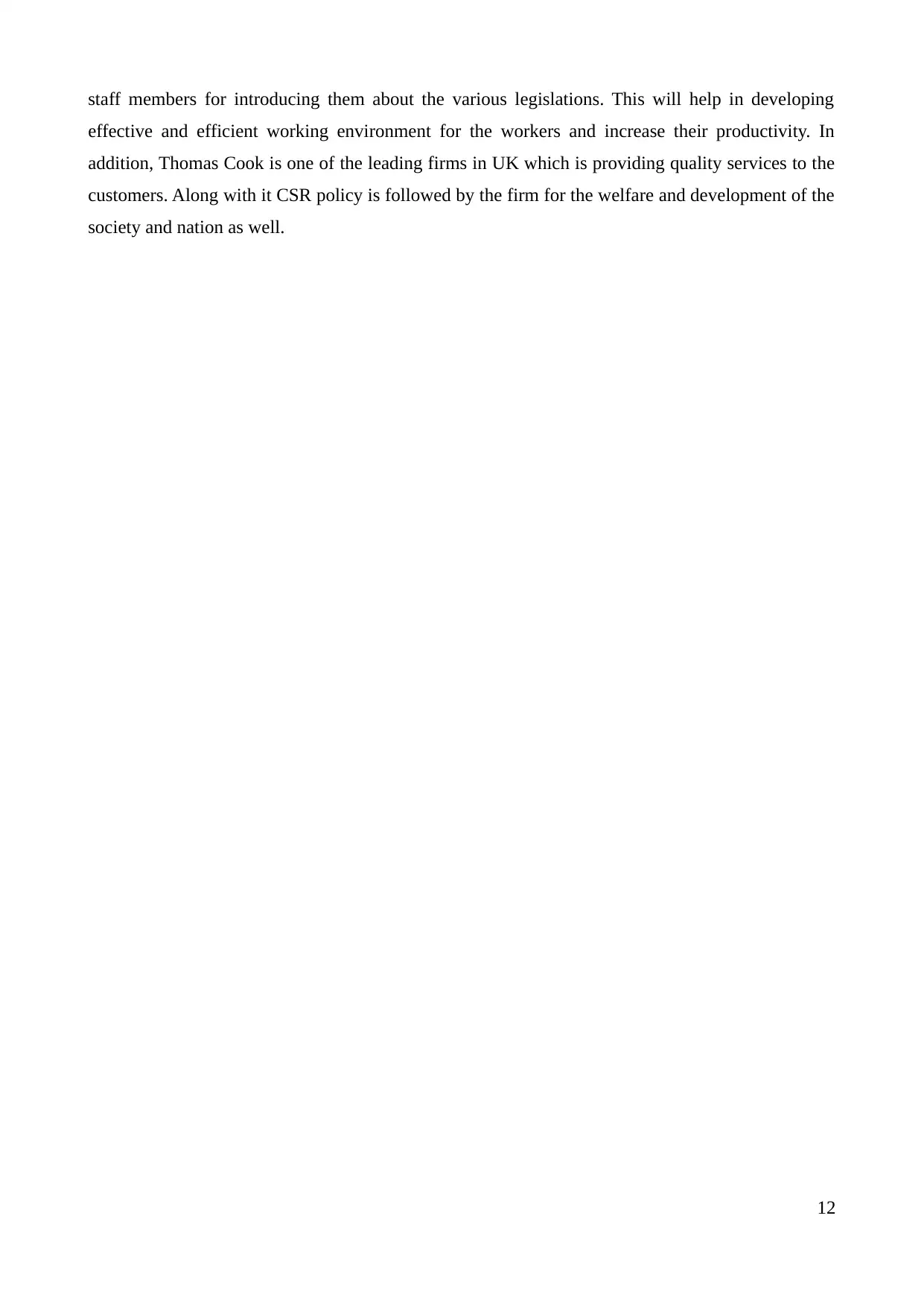
staff members for introducing them about the various legislations. This will help in developing
effective and efficient working environment for the workers and increase their productivity. In
addition, Thomas Cook is one of the leading firms in UK which is providing quality services to the
customers. Along with it CSR policy is followed by the firm for the welfare and development of the
society and nation as well.
12
effective and efficient working environment for the workers and increase their productivity. In
addition, Thomas Cook is one of the leading firms in UK which is providing quality services to the
customers. Along with it CSR policy is followed by the firm for the welfare and development of the
society and nation as well.
12
⊘ This is a preview!⊘
Do you want full access?
Subscribe today to unlock all pages.

Trusted by 1+ million students worldwide
1 out of 15
Related Documents
Your All-in-One AI-Powered Toolkit for Academic Success.
+13062052269
info@desklib.com
Available 24*7 on WhatsApp / Email
![[object Object]](/_next/static/media/star-bottom.7253800d.svg)
Unlock your academic potential
Copyright © 2020–2026 A2Z Services. All Rights Reserved. Developed and managed by ZUCOL.




